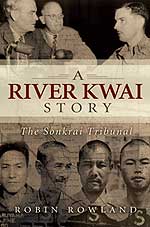When I started this blog, I made a conscious decision to keep it tightly focused on my book The Sonkrai Tribunal and issues around the book and the life of a freelancer, I wasn't going to talk about other issues or the CBC where I was employed am now locked out.
I am now going to stretch my decision just a little because of some of the comments that have appeared recently in the press about the main issue, keeping large numbers of new hires on call as casuals or on short term contracts. The Brits even have a word for it, which I found on the National Union of Journalists website casualization.
I am a locked out fulltime employee, but I have been working on my book for the past couple of years, part time an hour or so a night because the small advance was not enough to take time off work. It certainly would not have paid any bills if I didn't have a full time job.
In his column “Virtual Culture” in The Globe and Mail this morning, Russell Smith said As a career freelancer, I am not enthusiastically sympathetic to the union in this dispute; I have always worked on contracts (or even without a contract as I do here [referring to his Globe and Mail column]) and everyone I know in television works in contracts....so I am not filled with indignation at the prospect of the end of the CBC's famous Iron Rice Bowl. Such Maoist precepts seemed dated now.
First let me say that I was by my own choice, a full time freelancer in Toronto, one of Canada's most expensive cities for about 13 years from 1984, when I was laid off from the CBC's first new media project (yes Mr Smith there are layoffs at the CBC ) until 1997, when I was working full time at CBC Newsworld Online (but still a casual). I went on contract in 1998 and the last set of negotiations in 2000 converted many of the online staff, including myself, on contract to permanent staff.
Freelancing anywhere is like starting up a restaurant, most don't last a year. Thirteen years isn't bad, if I do say so myself.
But given my own experience and Smith's comments, I believe that he is ethically bound to reveal the complete source of his household income.
Why?
Because almost all the successful freelancers I know in this city are supported by their partners, most often partners who have full time staff jobs and most of them in non-creative businesses.
If Russell Smith is the sole support of his household he can make that statement. However, if a good proportion of his household income does come from other family members, then his statement is both unethical and hollow.
If he has fled the city for a farm or an inexpensive house in a small town, his statement is valid. If he lives in Toronto and the expense of this city is supported by other family members, then his statement is both unethical and hollow.
I was a single household, which in my case is just me and my cat, for most of the time I freelanced, so I really don't think of much of people who claim to be successful fulltime freelancers while the partner pays most of the mortgage.
Smith also says he works for the Globe and Mail without a contract. Does that mean he retains the rights to his column? He is ethically bound to answer that question as well.
The class action suit against the Globe and Mail and other papers is dragging on. The issue is whether or not freelancers can retain the rights to their material.
Once it was possible for a freelancer to sell slightly different versions of the same story to different outlets or use that material as the basis for further articles. That has become increasingly difficult in the past decade, one of the reasons that I decided being a freelancer was increasingly untenable.
It is the demand from many media organizations that freelancers surrender all rights in the past decade that along with rates with that have not kept pace with inflation that have driven many freelancers into staff jobs in TV (yes there are staff jobs in TV Mr. Smith) or have left creative industries altogether.
And that is a loss to Canadian culture.
One more thing, things are not so good south of the border for freelancers either. I have a large number of freelancer friends and acquaintances in the United States. They have a lot more outlets for their work than we do in Canada. But they have one huge problem we don't here. They tell me time and time again that most of that money goes for minimal health insurance. So their relative income isn't much better.
So my message to Russell Smith and the others who think the CBC is an Iron Rice Bowl are living in the 1970s. Get real.
Technorati tags
research, writing, journalism, CBC




